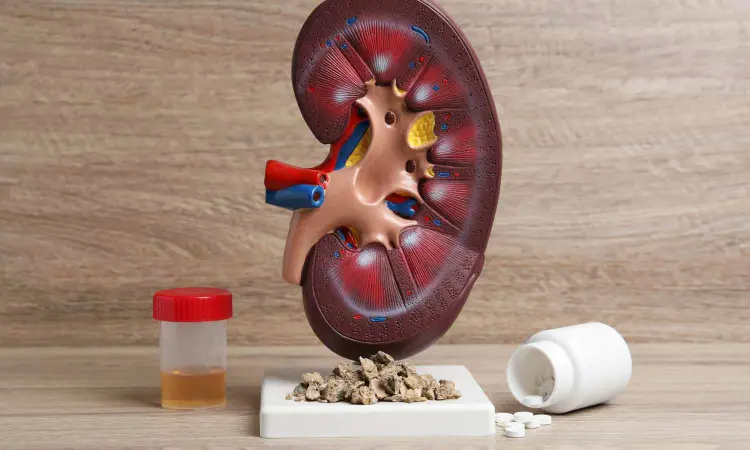- Home
- Medical news & Guidelines
- Anesthesiology
- Cardiology and CTVS
- Critical Care
- Dentistry
- Dermatology
- Diabetes and Endocrinology
- ENT
- Gastroenterology
- Medicine
- Nephrology
- Neurology
- Obstretics-Gynaecology
- Oncology
- Ophthalmology
- Orthopaedics
- Pediatrics-Neonatology
- Psychiatry
- Pulmonology
- Radiology
- Surgery
- Urology
- Laboratory Medicine
- Diet
- Nursing
- Paramedical
- Physiotherapy
- Health news
- Fact Check
- Bone Health Fact Check
- Brain Health Fact Check
- Cancer Related Fact Check
- Child Care Fact Check
- Dental and oral health fact check
- Diabetes and metabolic health fact check
- Diet and Nutrition Fact Check
- Eye and ENT Care Fact Check
- Fitness fact check
- Gut health fact check
- Heart health fact check
- Kidney health fact check
- Medical education fact check
- Men's health fact check
- Respiratory fact check
- Skin and hair care fact check
- Vaccine and Immunization fact check
- Women's health fact check
- AYUSH
- State News
- Andaman and Nicobar Islands
- Andhra Pradesh
- Arunachal Pradesh
- Assam
- Bihar
- Chandigarh
- Chattisgarh
- Dadra and Nagar Haveli
- Daman and Diu
- Delhi
- Goa
- Gujarat
- Haryana
- Himachal Pradesh
- Jammu & Kashmir
- Jharkhand
- Karnataka
- Kerala
- Ladakh
- Lakshadweep
- Madhya Pradesh
- Maharashtra
- Manipur
- Meghalaya
- Mizoram
- Nagaland
- Odisha
- Puducherry
- Punjab
- Rajasthan
- Sikkim
- Tamil Nadu
- Telangana
- Tripura
- Uttar Pradesh
- Uttrakhand
- West Bengal
- Medical Education
- Industry
Alkaline water of no benefit for preventing kidney stones: Study

USA: A recent study published in The Journal of Urology has shown negligible alkali content in commercially available alkaline water and thus has no added benefit over tap water for patients with uric acid and cystine urolithiasis.
"Bottled water marketed as "alkaline water" is unlikely to be an effective alternative for prevention of recurrent urinary stones," the researchers stated.
"While alkaline water products have a higher pH than regular water, they have a negligible alkali content-which suggests that they can't raise urine pH enough to affect the development of kidney and other urinary stones," comments senior author Roshan M. Patel, MD, of University of California, Irvine.
Alkaline water as alternative to prescription drugs for stone prevention?
Alkaline water, sometimes called high pH water, is an increasingly popular category of bottled water. Compared to tap water, with a typical pH around 7.5, alkaline water is manufactured to have a higher (more alkaline) pH – in the range of 8 to 10.
Consumption and sales of alkaline water have increased sharply in recent years. Proponents claim various health benefits, including improved hydration and increased urinary pH. Raising pH is a key strategy to prevent formation of certain types of urinary stones (uric acid or cystine) in patients with previous stones. (The Urology Care Foundation™ offers information on kidney stone prevention.)
Potassium citrate tablets are commonly prescribed to prevent recurrent stones. However, many patients do not follow recommended treatment – often related to the need to take large pills several times per day. If alkaline water could raise urinary pH, it might be an attractive alternative for stone prevention.
To assess the potential for high pH water to prevent urinary stones, Dr. Patel's team measured the pH of five commercially available alkaline water products. They also reviewed published data on other types of drinks and over-the-counter products with the potential to raise urinary pH.
Despite higher pH, alkaline water has 'trivial' alkali content
The five brands tested in the study had a similar pH, in a narrow range around 10. One product contained a small amount of citrate, which was not listed on the product label. Otherwise, the tested alkaline waters had no organic anions that can be metabolized to alkali by the body – as supplied by potassium citrate tablets.
At a pH of 10, the tested products would have an alkali content of just 0.1 milliequivalent per liter (mEq/L). That's a "trivial" concentration compared to the body's typical metabolic acid production of 40 to 100 mEq/L per day, according to the authors.
In contrast, some other commercially available products do have the potential to increase pH-notably including orange juice, with an alkali content of up to 15 mEq/L. Orange juice also has the lowest estimated cost to achieve the target alkali concentration of 30 mEq per day.
Baking soda was among the most effective and cost-efficient alternatives, although with potential concerns related to sodium content. Newer products dissolvable in water also appeared to provide useful and affordable options. The article includes a graphic table comparing the alkali content of various products and their costs in reaching target alkali levels.
"Our findings may help to guide the selection of other treatments, including beverages and over-the-counter products, for preventing recurrent urinary stones," adds Dr. Patel. The researchers note the limitations of their laboratory study and emphasize the need for clinical trials of the options for raising urinary pH.
Reference:
Piedras P, Cumpanas AD, McCormac A, Lavasani SAM, Gorgen ARH, Rojhani A, Vu MC, Bhatt R, Asplin J, Tano ZE, Landman J, Clayman RV, Patel RM. Alkaline Water: Help or Hype for Uric Acid and Cystine Urolithiasis? J Urol. 2024 Feb;211(2):276-284. doi: 10.1097/JU.0000000000003767.
Dr Kamal Kant Kohli-MBBS, DTCD- a chest specialist with more than 30 years of practice and a flair for writing clinical articles, Dr Kamal Kant Kohli joined Medical Dialogues as a Chief Editor of Medical News. Besides writing articles, as an editor, he proofreads and verifies all the medical content published on Medical Dialogues including those coming from journals, studies,medical conferences,guidelines etc. Email: drkohli@medicaldialogues.in. Contact no. 011-43720751


